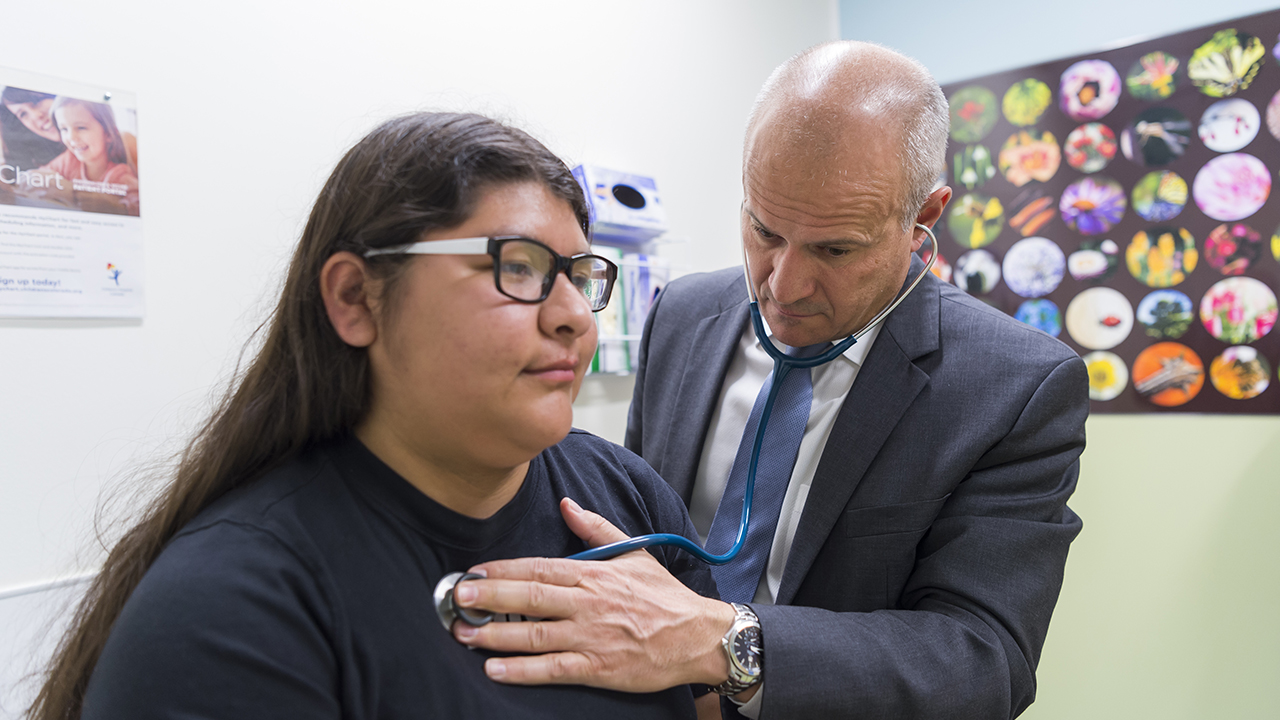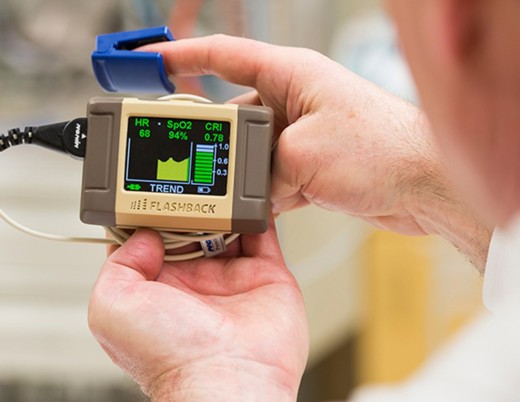Key takeaways
-
Randomized control trials and meta-analyses show improvements in outcomes when ERAS principles are used in adult surgical populations.
-
Data on ERAS outcomes in pediatric surgery subspecialties are now emerging. Pediatric surgeons at Children’s Colorado have developed an ERAS protocol for adolescents undergoing bariatric surgery.
-
Rigorous analysis is pending, but results suggest ERAS-driven care in these patients improves comfort and satisfaction, reduces complications and shortens hospital stays without increasing readmissions.
Research background: Can enhanced recovery after surgery ERAS protocols improve outcomes for adolescents undergoing bariatric surgery?
Many adult surgical subspecialties, including bariatric surgery, have widely implemented principles of enhanced recovery after surgery (ERAS), a multidisciplinary, patient-centered approach to optimize pre-, intra- and postoperative care. These protocols improve patient outcomes by shortening hospital stays, reducing complications and lowering mortality rates. More recently, surgeons have applied ERAS principles to multiple pediatric surgery subspecialties, with good results.
Children’s Colorado researcher Kyle O. Rove, MD, a pediatric urologic surgeon, reviewed the history and goals of ERAS and its outcomes in adult and pediatric surgical subspecialties. He describes Children’s Colorado’s recently implemented ERAS protocol for adolescents undergoing bariatric surgery.
ERAS was developed in the 1990s and is now common in adult surgery
Dutch colorectal surgeon Henrik Kehlet, MD, developed ERAS in the late 1990s to standardize perioperative care and improve surgical recovery. Kehlet’s early work, published in 1999, emphasized a multimodal “fast track approach” that significantly shortened hospital stays after sigmoid colectomy.
A general lack of standardized perioperative care drove wider acceptance of ERAS, and European surgical groups in 2001 formed the ERAS Study Group, which published its first evidence-based best practice guidelines in 2005. Worldwide, multiple surgical subspecialties, including bariatric and pediatric surgery, have now adapted ERAS principles to improve patient outcomes.
ERAS strategies aim to minimize surgical stress responses
Surgical stress responses can occur with otherwise successful procedures and complicate and prolong recovery. Undesirable sequelae that can be mitigated with ERAS in the pre-, intra- and postoperative phases include pain, cognitive dysfunction, cardiac and pulmonary complications, nausea and vomiting, ileus, fatigue and prolonged return to baseline function.
General principles of ERAS:
| Preoperative | Intraoperative | Postoperative |
| Optimizing comorbidities | Maintaining a euvolemic state | Returning patients quickly to enteral nutrition, mobilization and out-of-bed activities |
| Educating patients and families | Avoiding unnecessary drains | Avoiding nasogastric tubes |
| Avoiding bowel preparation | Minimizing opioid analgesics | Implementing multimodal pain management that minimizes opioid analgesics |
| Minimizing nil per os time | ||
| Loading with clear liquid complex carbohydrate | ||
ERAS improves outcomes in many adult surgical subspecialties
Benefits include shorter hospitalizations and fewer complications, readmissions and deaths. The majority of ERAS outcomes data come from research in adult colorectal surgery patients, but additional data from other surgical subspecialties support similar benefits.
A meta-analysis of 16 randomized controlled trials of adult colorectal surgical patients compared traditional perioperative care with ERAS. Results showed ERAS strategies:
- Shortened hospital stays by 2.28 days without increasing readmissions
- Reduced nonsurgical complications by 60%
- Reduced mortality by 40%
Other benefits seen with ERAS versus conventional care include preserved lean body mass, less time with ileus, faster return to normal activity, increased patient satisfaction and decreased hospital costs.
Surgeons adapt ERAS principles for pediatric surgery populations
Initial studies of ERAS in children undergoing colon resection, pyeloplasty, pyloromyotomy, fundoplication, hypospadias repair and nephrectomy examined outcomes with implementation of various ERAS elements. These early studies, however, did not incorporate comprehensive ERAS protocols and the mean number of ERAS care elements implemented was six versus 24 in adult studies. In addition, none reported ERAS protocol compliance, and most had inadequate control populations.
More recent studies in pediatric surgical populations are higher quality, minimizing confounders, reporting protocol compliance and using larger control groups. Some show promising results.
A 2018 study retrospectively compared 36 ERAS patients with 43 pre-ERAS patients undergoing elective colorectal operations.
Compared with pre-ERAS patients, ERAS patients experienced:
- More ERAS process measures
- Shorter hospital stays
- Decreases in time to resuming a regular diet, opioid usage and intraoperative fluid volumes
- No increases in readmission
In 2018, Children’s Colorado researchers reported results from a pilot study of patients that matched 13 ERAS patients undergoing bladder reconstruction with bowel anastomosis with 26 recent historical controls.
Compared with pre-ERAS patients, ERAS patients experienced:
- More ERAS process measures (8 vs. 12)
- Shorter hospital stays (5 vs. 6 days)
- Fewer 90-day per-patient complications (2.1 vs. 1.3)
Data demonstrating safety and efficacy of ERAS for complex pediatric surgical procedures are spurring research in these populations. Dr. Rove is the principal investigator for a large multicenter observational study examining ERAS implementation, perceived practitioner barriers, protocol compliance and patient outcomes in participants aged 4 to 25 years undergoing urologic reconstructive surgery.
ERAS principles are used widely in adult bariatric surgery
The protocol has led to reduced operative time, opioid use, postoperative nausea and vomiting, and hospital stays without increasing complications or readmission. Research also shows adult bariatric patients managed with ERAS principles have lower hospital costs and a faster return to normal activities. Severe obesity, however, may pose unique challenges that require modification of some ERAS tenants.
ERAS protocols in adolescent bariatric surgery
Children’s Colorado implemented 16 ERAS-driven care for adolescents undergoing bariatric surgery in 2019. The overarching goals are to provide patients with holistic care that improves comfort and reduces complications and hospitals stays.
Main principles:
- Maintaining a euvolemic state
- Optimizing multimodal analgesia
- Limiting postoperative nausea and vomiting
- Encouraging early oral intake
There are no published data on ERAS benefits for adolescents undergoing bariatric surgery and a rigorous analysis of outcomes at Children’s Colorado is pending. Early results from Children’s Colorado suggest excellent patient satisfaction and results.
Children’s Colorado ERAS process measures for adolescents undergoing bariatric surgery
| Preoperative | Intraoperative | Postoperative |
| Carbohydrate loading: up to 350 mL ClearFast, Gatorade, Powerade or Pedialyte 2 to 3 hr prior to scheduled surgery start time | Euvolemia (<1000 mL of crystalloid) | POD 0 ambulation |
Prophylactic cefazolin administered within 30 min of incision
|
Normothermia (upper body Bair hugger) | Low-molecular-weight heparin (40 mg SQ twice daily) |
| Low-molecular-weight heparin (40 mg SQ) | Minimize opioids | Scheduled acetaminophen (650 mg PO every 6 h) |
| Scopolamine patch (1 mg transdermal) | Dexamethasone 4 mg IV and ondansetron 4 mg IV for PONV prophylaxis | Scheduled NSAIDs (30 mg IV ketorolac for first 24 hr followed by 600 mg PO Ibuprofen every 6 hr) |
| Ketorolac (30 mg IV) prior to extubation | Omeprazole (40 mg PO daily) | |
| MIVF on POD 0 at 75 mL/h (discontinue on POD 1) | ||
| Minimize opioids | ||
| SQ, subcutaneous; IV, intravenous; PO, oral; PONV, postoperative nausea and vomiting; POD, postoperative day; NSAIDs, non-steroidal anti-inflammatory drugs; MIVF, maintenance intravenous fluids. | ||
Summary: ERAS principles should improve adolescent bariatric surgery patient outcomes
Researchers concluded that with time, evidence-based principles of ERAS will likely become the standard of care for adolescent bariatric surgery as it has for many other surgical subspecialties.
Featured Researchers

Kyle Rove, MD
Pediatric urologist
Department of Pediatric Urology
Children's Hospital Colorado
Associate professor
Surgery-Urology
University of Colorado School of Medicine





 720-777-0123
720-777-0123










